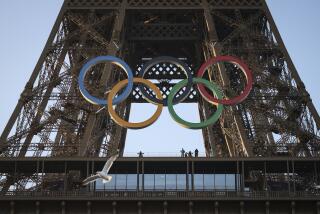Olympics, Website Hit It Off
- Share via
TURIN, Italy — As Olympic TV ratings sagged over the last two weeks and viewers switched channels from the Games to “American Idol,” NBC got one piece of very good news.
The network’s website for the 2006 Turin Games, NBCOlympics.com, recorded 338 million page views through Saturday, more than doubling the number of hits from the 2002 Salt Lake City Games.
And that, some experts said, was promising not only for broadcasters but for the entire Olympic movement. “We are clearly in a new era,” said David Carter, executive director of the USC Sports Business Institute. “We have to see a new model for how the Olympics are delivered.”
The Internet could lead straight to a group that broadcasters and the International Olympic Committee covet most -- young fans. Enmeshed in a world of text messaging, chat rooms and instant news, this demographic appears to be turned off by nightly packaged programming.
With the time difference in Italy, that meant waiting around to watch events that had finished hours earlier.
“They’re saying, ‘What do you mean I can’t see it now?’ ” said Paul Swangard, managing director of the Warsaw Sports Marketing Center at the University of Oregon.
Not only are young consumers hungry for quick information, experts said, they are accustomed to paying for it.
Unlike their parents, who grew up watching over-the-air television and listening to the radio, the newer generation is comfortable with monthly cable bills and pay-per-view and spending money to download music.
In an odd way, putting more of the Games online with streaming video would hark back to the “Triplecast,” an old broadcasting experiment gone awry.
At the 1992 Barcelona Games, NBC offered a subscription package that gave viewers live and greatly expanded coverage. There weren’t many takers and the “Triplecast” flopped, considered something of a joke within the industry.
Yet, more than a decade later, the model might be updated.
“The notion of what it represented is not a bad idea in 2006,” Swangard said. “This idea that someone is willing to pay for the Olympics when they want it, how they want it.”
The tricky part will be figuring out how to package myriad events and how to charge for them.
Should viewers have to subscribe to the entire Games? Might they be able to order specific events or days? And how can the IOC protect itself against piracy in a wide-open medium?
“It’s an incredible challenge and an incredible burden,” Carter said.
In light of television ratings the last two weeks, it might be a challenge worth facing.
“For generations, the media has supplied [the Olympics] on their own terms,” Carter said. “Now consumers are demanding how they want it, and it’s about time the industry woke up.”
More to Read
The biggest entertainment stories
Get our big stories about Hollywood, film, television, music, arts, culture and more right in your inbox as soon as they publish.
You may occasionally receive promotional content from the Los Angeles Times.











